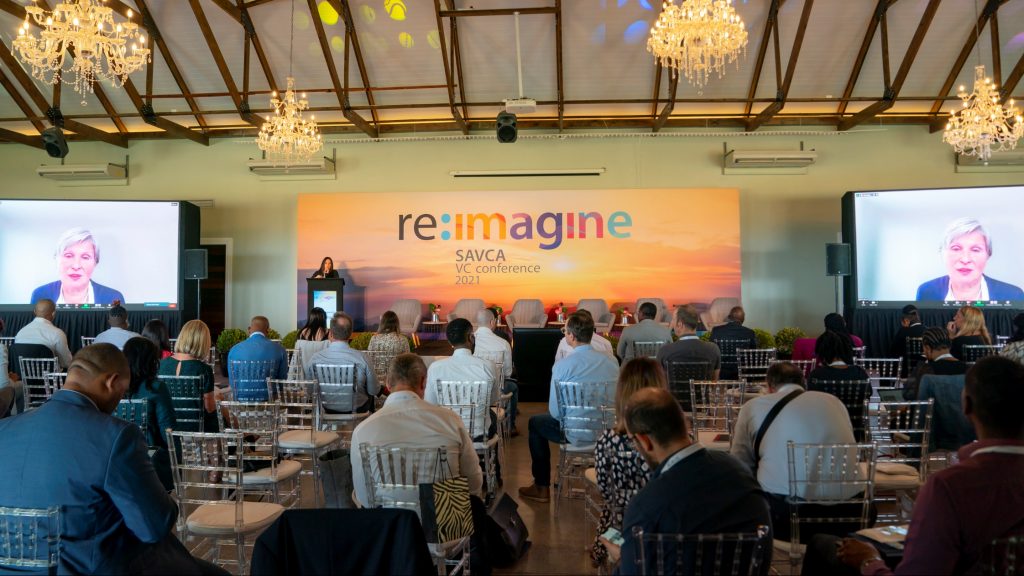We all have them. Those apps we open without thinking. Not because we need anything in particular, but because they feel… safe, in some…
Recap: 2021 SAVCA Venture Capital Conference

The Southern African Venture Capital and Private Equity Association (SAVCA) represents about 170 members who manage more than R185 billion in assets and its conferences attract the interest of all stakeholders across the public and private divide.
In the 2021 instalment of the VC conference, hosted at Eureka Wine Estate on 15 November, speakers and attendees were called to reimagine the part private equity can play in rebuilding the economy.
The theme for the 2021 SAVCA VC Conference was reimagine.
Fireside Chat: The role of government in enabling a vibrant VC ecosystem
Ketso Gordhan, SA SME Fund CEO hosted the opening session and emphasised the importance of government support in the rise of the VC ecosystem. He pointed to Silicon Valley and Israel as examples of government policies that have underpinned successful and innovative VC industries.
Mmboneni Muofhe, Deputy Director-General: Technology Innovation in the Department of Science and Innovation, highlighted the solid foundation that the SA government has laid for doing something similar here by investing in research and development (R&D). He cited research that shows the South African government funds more than 50% of the country’s R&D. This contrasts to other countries where governments’ contributions are typically closer to 33%.
“We need to continue to strengthen R&D as a foundation for a thriving VC ecosystem,” he said.
He went on to illustrate the urgent need for innovation in SA. “There is no better time than now to strengthen the VC ecosystem, support start-ups and those producing promising ideas and fresh solutions. Ultimately, we need innovation to get us out of our economic rut,” he said.
Is it feasible or pragmatic for a southern African institutional investor to back VC?
Debate: To invest or not to invest in VC?
The opposing front consisted of David Moore, Head of Alternative Investments: Alexander Forbes; Andile Keta, Group Executive, Investments and Corporate Finance: Rand Mutual Assurance and Mathabo Zandile Makhaya, Chairperson – Investment Subcommittee: Mineworkers Provident Fund.
They argued that high VC fees, illiquidity, volatility, difficulties with valuation and regulatory requirements were the main impediments to VC investing.
“Our clients don’t like high fees,” Moore said. “VC managers are expensive by virtue of what they do and that is a challenge for us”.
Makhaya’s view was that there’s a need for capital allocators to improve their understanding of the VC industry. “There’s a gap in education in that capital decision-makers don’t always understand VC structures. The negatives of VC investing are well-known but we need to learn more about how to work around these issues”, said Makhaya.
Keta (one of the opponents) agreed there’s an education element missing. “We have to start inviting asset managers to present their strategies, get our investment committee comfortable understanding with the assets. We need to work together to be creative in coming up with solutions that enable us to match our long-term liability profiles,” he said.
Nchaupe Khaole, Chief Investment Officer: Mineworkers Investment Company (MIC), who sat on the proponents’ side of the debate responded that collaboration is a way to mitigate some of these perceived risks. He said: “Because the industry is at such a nascent stage of development, industry players are very open to idea sharing so as to drive the industry forward.”
The other proponent, Henri Zietsman, Startup Business Development: Amazon Web Services (AWS), was also supportive of the idea of collaboration. “The way I diversify is by collaborating with venture firms, especially with accelerators like Grindstone”, he said.
A showcasing of six early-stage investors and their portfolio companies to demonstrate how their deals make a positive impact on society and the environment was a new addition to the conference.
Showcasing Competition
The first three were highlighted in the morning: AURA, FlexClub and Matter. AURA is a marketplace for on-demand emergency response services, making on-demand emergency services accessible, inclusive, and affordable. FlexClub offers a subscription model for mobility assets like cars and motorcycles while Matter digitizes remote infrastructure assets, facilitating efficiency and sustainability through real-time monitoring.
The afternoon’s showcase consisted of FinFind, an online platform that matches providers and seekers of small business finance, HomeFarm, provider of indoor farms and gardens to consumer and commercial markets, and Tripplo, who is creating a new standard for African road freight.
The showcasing component of the conference was held as a competition, with delegates invited to vote for their favourite early-stage start-up – Tripplo took the top spot.
Featured image supplied by SAVCA


